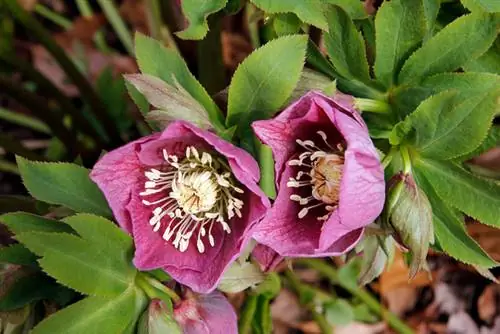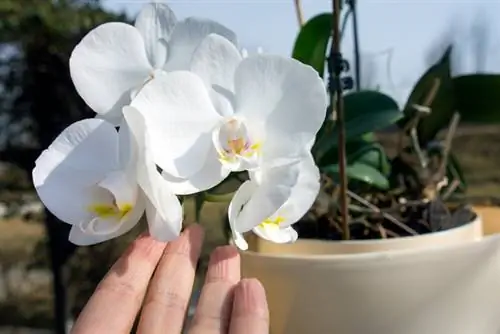- Author admin leonars@hobbygardeners.com.
- Public 2023-12-16 16:46.
- Last modified 2025-01-23 11:22.
The beautiful garden hydrangea is particularly popular with botanists. However, the splendor of the flowers also holds many secrets. In some cases, touching can have unpleasant consequences. Allergy sufferers should be careful about direct physical contact with the hydrangea.

Which allergies are caused by hydrangeas?
Hydrangeas triggercontact allergies. For allergy sufferers, direct contact causes skin irritation and itchy rashes. Using gardening gloves prevents allergic reactions. Consuming the plant is not recommended as it causes shortness of breath, dizziness and cramps.
Are hydrangeas dangerous for allergy sufferers?
The hydrangea causes skin irritation in humans, but is also for allergy sufferersnot life-threatening However, increased caution is required when handling the plant. People who are particularly susceptible should therefore protect themselves from the toxic essences. Be sure to use gardening gloves and wash your hands thoroughly after gardening. Also avoid direct contact with the mucous membranes. The poisonous hydrangea causes problems with the digestive and nervous systems.
Does the hydrangea contain a poison that causes allergies?
The hydrangeacontains toxins which cause allergic reactions in some people and animals. The substances glycoside hydrangin, coumarin hydrangenol and saponins are mainly contained in the leaves and flowers of hydrangeas. The particularly toxic hydrogen cyanide is also detected in the magnificent plant. The hydrangea must therefore never be eaten or put in the mouth. Although it is one of the mildly poisonous plant species, it is still the dose that makes the poison. In the worst case, an overdose can be fatal for humans.
Do all types of hydrangeas cause allergies?
The individual toxins are contained inall types of hydrangeasandsolvein some casesAllergies Therefore, handle all types carefully and make sure to clean your hands thoroughly. The toxin from the various hydrangeas should not get on your face.
Tip
Garden hydrangeas and allergic pets
Hydrangeas are also poisonous to animals. The toxins cause symptoms of poisoning in the animal inhabitants that are similar to those in humans. Therefore, keep your pets away from the hydrangea. Although the toxic substances are not fatal to animals, consuming the plant is not beneficial for your four-legged friend's he alth. However, the bitter taste of the hydrangea is usually a deterrent at the first bite.






